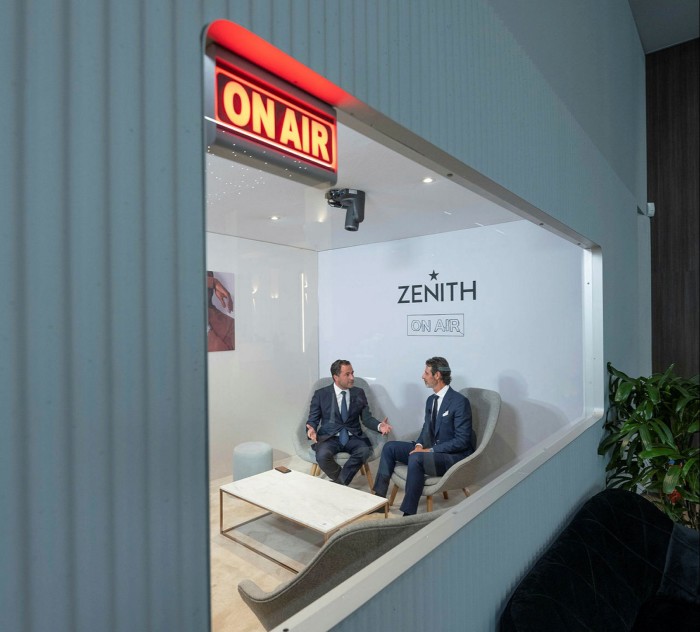Brands step up the podcast charm offensive to reach would-be clients

Simply sign up to the Media myFT Digest -- delivered directly to your inbox.
It was British radio’s long established programme Desert Island Discs that inspired Annoushka Ducas to start a podcast to market her bespoke charm service. Now, for each episode of My Life in Seven Charms, the British jeweller interviews a woman whose career she admires.
Unlike the BBC show, which asks its celebrity invitees for eight of their favourite musical tracks, she charts her guests’ life stories in charms. “It brings jewellery to life,” she explains. “So often, jewellery is in a box or safe. It’s a static thing until you know the story behind it.” Ducas says the podcast has led to new commissions and is “thought-provoking” for clients who already use her service.
She is not alone in embracing digital audio content. Many watch and jewellery brands have stepped up podcast activity. In a 2021 survey, 41 per cent of UK residents aged 16+ (about 23mn) had listened to a podcast in the last month, according to Edison Research’s Infinite Dial UK report.
The proportion was the same in the US, up from 15 per cent in 2014.
Boucheron True Stories began in 2020 as the French jeweller adapted its editorial content to the pandemic. It launched with a five-episode series on the subject of weddings.
The podcast returned in January with an episode to mark the launch of New Maharajahs, a high jewellery collection. It tells of an extravagant order placed in 1928 at Boucheron in Paris by the Maharaja of Patiala, which inspired the modern designs.
Released in English, French and Mandarin, the episode attracted 220,000 plays, with about 95 per cent of its listeners in China, thanks to a media campaign there.
Boucheron plans to produce an episode for every new high jewellery collection. “It is a great way for our audiences to know more about our philosophy, our history, and our craftsmanship,” says Boucheron chief executive Hélène Poulit-Duquesne. “[Consumers] no longer wish to just buy a luxury product. They want to go behind the scenes.”
Poulit-Duquesne will also record episodes on corporate topics, such as sustainability.
Chaumet plans more episodes of its Virtuoso Conversations podcast.
Meanwhile, Bulgari will make a second series of B*Maestro, which launched this year.
Neil Cowling, founder of Fresh Air Production, a London company that specialises in branded podcasts, says it is a fast-growing sector. He says podcasts are good for “thought leadership” and branding.
They gain someone’s “full attention in a way that is almost impossible to get on a screen when scrolling”, he says.
“Nobody accidentally listens to a podcast,” Cowling argues. “Right from the start, you know that your audience are to some degree engaged in the topic and that enables you to dive into more detail and nuance.”
UK listeners averaged five podcast episodes a week last year. Cowling, whose company produces monthly episodes of Calibre for Watches of Switzerland, says the frequency of release is important.
“What you’re trying to do as a brand is edge your way into that habit of listening . . . and that’s very difficult to do if you do a series of three and then wait for six months and then create another short series,” he says.
Julien Tornare, chief executive of Zenith, is keen to “speed up the rhythm” of his brand’s podcasts.
Zenith released a 12-episode series marking the 50th anniversary of its El Primero chronograph movement in 2019. The brand is planning more activity this year.
“[The] learning from the 2020 crisis, when we were stuck at home, is that the watch industry is not supposed to make only a big noise when there is a watch show, but we need to keep the activity all year long,” Tornare says.
During this year’s Watches and Wonders trade show, Zenith ran talks each night with brand ambassadors and friends from a studio built into its stand, and broadcast these on Instagram Live.
It also launched three short audio testimonials in support of the travelling Master of Chronographs exhibition, which achieved 75,000 listens on its website during the fair, as well as 35,000 on Instagram.
Tornare says feedback from retailers suggests that digital audio content is helping to “widen our customer base”.
He is surprised by the success of the format considering the popularity of visual media but says podcasting is “targeted” and “cost-efficient” (Fresh Air Production charges £2,000 to £3,000 on average to produce a straightforward branded podcast episode).
Perhaps Tornare should not be that surprised. To take his own example, he listens to podcasts about watches to glean free information on collectors, as well as feedback on Zenith, the competition, and the industry. “Podcasts are a great source of learning and better understanding clients,” he says.
Comments